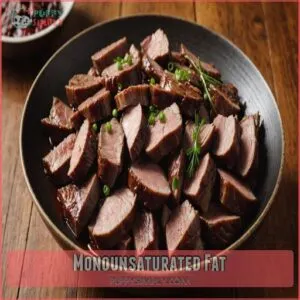This site is supported by our readers. We may earn a commission, at no cost to you, if you purchase through links.
 Can dogs eat duck? Absolutely! Duck is a fantastic protein-packed option for your furry friend, especially if they’re working on their summer body. It supplies lean protein, low in saturated fats, and contains healthy fats to boost energy for all those park runs.
Can dogs eat duck? Absolutely! Duck is a fantastic protein-packed option for your furry friend, especially if they’re working on their summer body. It supplies lean protein, low in saturated fats, and contains healthy fats to boost energy for all those park runs.
Think of duck as the ultimate energy bar for dogs without the sugar. But, remember to remove the bones and avoid seasoning.
A sprinkle of fun fact: duck is rich in omega-3 and omega-6, like a fish in a bird’s clothing! Stay tuned to discover the best ways to serve this quackingly good meal safely.
Table Of Contents
- Key Takeaways
- Nutritional Benefits of Duck for Dogs
- Preparing Duck for Dogs
- Risks of Raw Duck and Duck Bones
- Frequently Asked Questions (FAQs)
- Can dogs eat duck meat?
- Can dogs eat duck kidneys?
- Can dogs with food allergies eat duck?
- Is duck food good for dogs?
- Can dogs eat duck eggs?
- How do I get my Dog to eat duck?
- Can my dog eat cooked duck?
- What happens if my dog eats a duck?
- Can duck upset a dogs stomach?
- What is better for dogs, chicken or duck?
- Can dogs eat duck if cooked with seasoning?
- How often can dogs eat duck meat?
- Is duck safe for puppies to eat?
- Does duck meat cause allergies in dogs?
- What are signs of duck intolerance in dogs?
- Conclusion
Key Takeaways
- You can feed your dog cooked duck, but always remove the bones.
- Duck is a good source of protein and healthy fats, beneficial for many dogs.
- Avoid seasoning; salt, garlic, and onions are toxic to dogs.
- Introduce duck gradually and monitor your dog for any allergic reactions.
Nutritional Benefits of Duck for Dogs
If you’re wondering whether to add duck to your dog’s diet, you’re in luck, as it’s packed with health benefits.
Duck offers your furry friend a complete protein source, healthy fats, and essential nutrients like Omega-3s, vitamins, and minerals, keeping them happy and full of energy.
Complete Protein
Duck meat is a fantastic choice for your pup, offering a complete protein that supports muscle growth and repairs tissues.
Packed with essential amino acids, it can meet your dog’s dietary needs just like an excellent gym buddy for muscle-building.
Consider duck as a treat for dogs with allergies, providing lean protein that fits smoothly into varied diets.
Monounsaturated Fat
Ever wondered about the hidden power in duck meat for your furry friend?
Among its many health benefits, you’ll find monounsaturated fats.
These healthy fats provide sustained energy, keeping your dog active and playful.
It’s like a natural energy boost!
Plus, monounsaturated fats contribute to healthy skin and a shiny coat, making your dog look their best.
So, including a little duck in your dog’s diet might be a winning move for their overall well-being.
Remember moderation is key, just like with any treat!
Omega-3 and Omega-6 Fatty Acids
Imagine this: Your dog’s coat is shiny, and their brain is sharp, all thanks to the fatty acid balance from duck, which can be easily maintained with a balanced duck kibble diet.
Omega-3 and Omega-6 fatty acids in duck support brain development, dog coat health, and overall wellness.
Think of it as nature’s way of adding a shiny, healthy glow to your
Vitamin B Complex
While Omega-3 and Omega-6 fats keep coats glossy, vitamin B complex in duck meat is a true powerhouse for dogs.
It supports their nervous system and energy levels.
Here’s why you’ll love it:
- Boosts cell growth
- Aids in glucose regulation
- Ensures smooth metabolism
- Helps cardiovascular health
It’s like giving your furry friend a little pep in their step!
Minerals
Quack into better health with duck!
It’s packed with important minerals like selenium and iron, boosting your dog’s immune system and helping prevent mineral deficiencies.
Unlike duck bones that could break a tooth, this nutritional powerhouse supports overall duck nutrition.
So, skip the mineral supplements and opt for this tender, mineral-rich treat.
Your pooch will thank you!
Preparing Duck for Dogs
When you’re preparing duck for your furry friend, make sure to cook it thoroughly and remove all bones to keep them safe.
Skip the seasoning and serve it in moderation, ensuring your dog gets a tasty treat without any unwanted side effects.
Cooking Recommendations
What about transforming these great nutrients into delicious meals for your dog?
Start by ensuring the duck reaches an internal temp of 165°F; this kills any lurking nasties. Keep it simple, without seasonings that can harm them, and remember that duck is a suitable poultry alternative that can be especially helpful for dogs with poultry sensitivities.
Here are some safe cooking methods:
- Roasting or baking
Removing Bones
Imagine you’re prepping duck for your dog’s dinner.
Bone safety can’t be brushed aside—duck bones pose choking hazards and risks of splinters.
| Bone Issue | Risk Level |
|---|---|
| Choking Hazard | High |
| Splintering | High |
| Digestibility | Low |
Always remove bones for safe handling and avoid raw duck risks.
Cooked duck for dogs needs proper bone removal to make sure their safety.
Feeding in Moderation
Now that you’ve carefully removed all those pesky bones, let’s talk portion control! Remember, duck, while delicious, is a treat, not a meal. Think of it as a fun bonus, not the main course.
It depends on their weight, of course. A small dog needs less than a Great Dane!
- A tiny bite for tiny pups!
- A moderate amount for medium-sized dogs.
- A generous portion for large breeds.
Always check with your vet for personalized advice on Treat Frequency and Portion Control for your dog’s weight and Treat Type.
Avoiding Seasoning
Moderation is key, but seasoning is a no-go.
While salt, garlic, onion, or spices might tickle your taste buds, they’re not safe for your furry friend.
You can find safe and tasty duck treats for your pup, like duck dog bones, to enjoy as a special treat.
Stick to plain duck to keep it a safe treat.
A plain dish lets your dog enjoy duck meat without risks.
Remember, in terms of dogs, plain beats gourmet every time.
| Ingredient | Safe for Dogs? | Risk Level |
|---|---|---|
| Salt | No | High |
| Garlic | No | High |
| Onion | No | High |
| Spices | No | Moderate |
| Herbs | Depends | Variable |
Risks of Raw Duck and Duck Bones
Feeding your furry friend raw duck might seem like a treat, but it carries risks you shouldn’t ignore.
Raw duck can harbor pathogens like Salmonella, posing a Salmonella risk to both dogs and humans.
Raw duck digestion is more challenging than cooked, potentially leading to upset stomachs or gut blockages.
Duck bones are another story; they can easily snap and splinter, turning into little danger traps.
If you’re considering giving your dog a chew, check out these duck bone treats.
These splinters can cause choking hazards or even internal injuries.
To keep your dog safe, stick to thoroughly cooked duck and always remove the bones.
By doing so, you’ll dodge the duck bones dangers and make sure mealtime is a joyous, safe affair for your beloved pup.
Frequently Asked Questions (FAQs)
Can dogs eat duck meat?
You can feed your dog duck meat, just make sure it’s cooked thoroughly and bone-free.
It’s a great protein source, especially for dogs with allergies.
Remember to skip the seasoning and serve it in moderation!
Can dogs eat duck kidneys?
Picture your furry friend enjoying a small feast.
Dogs can eat duck kidneys, but cook them thoroughly and feed in moderation.
Avoid seasonings; focus on balance to keep tails wagging and digestive issues at bay.
Can dogs with food allergies eat duck?
Yes, duck can be a great alternative! It’s often hypoallergenic, but always check with your vet before switching your pup’s diet. Cook it thoroughly, removing bones – safety first!
Is duck food good for dogs?
Duck meat boasts 25 grams of protein per 100 grams, making it a nutritious choice for dogs.
It’s a tasty source of amino acids, vitamins, and minerals.
And especially beneficial for dogs with allergies or sensitive stomachs.
Can dogs eat duck eggs?
You can give your dog duck eggs, but cook them first to avoid health risks.
They’re rich in protein and nutrients, but keep portions small due to high fat and cholesterol.
Check with your vet if unsure.
How do I get my Dog to eat duck?
Introduce duck gradually by mixing it with your dog’s favorite food, ensuring it’s cooked without seasoning.
You can also use duck as a training treat, making meal times an exciting reward for your furry friend.
Can my dog eat cooked duck?
Cooking duck for your dog is safe, as long as you thoroughly cook it and remove any bones.
Duck offers a tasty protein source, but remember, moderation is key, and avoid adding any seasonings.
What happens if my dog eats a duck?
If your dog eats a whole duck, concerns include choking on bones and digestive blockages.
Cooked duck bones can splinter, causing harm.
Monitor your dog closely, and contact a vet if any issues like vomiting or discomfort arise.
Can duck upset a dogs stomach?
Duck can upset a dog’s stomach if it’s not cooked properly or given in large amounts.
Start small to see how your dog reacts, since some pups might’ve more sensitive stomachs than others.
Keep it simple and seasoned-free.
What is better for dogs, chicken or duck?
Heartbreakingly bland chicken or deliciously flavorful duck? For your dog, duck’s a healthier, leaner protein packed with nutrients, but always cook it thoroughly! Moderation is key, of course.
Can dogs eat duck if cooked with seasoning?
Your dog shouldn’t eat duck cooked with seasoning.
Seasonings like garlic, onion, and excessive salt can harm dogs.
Play it safe, stick to plain, cooked duck without spices, and your pup will thank you with happy tail wags!
How often can dogs eat duck meat?
You can feed your dog duck meat occasionally, ensuring it doesn’t exceed 10% of their diet.
Cook it thoroughly and keep it plain—no seasoning!
Consider it a special treat, not a regular meal item.
Is duck safe for puppies to eat?
Puppies can safely eat duck if you prepare it properly.
Cook it thoroughly, remove bones, and skip the seasonings.
Duck provides protein and essential nutrients, making it a tasty treat in moderation, much like a little guilt-free indulgence.
Does duck meat cause allergies in dogs?
While duck meat is generally safe and a good protein alternative for dogs, some can develop allergies.
It’s less common than with chicken or beef, but always introduce it gradually and watch for any reactions.
What are signs of duck intolerance in dogs?
Did you know that 10% of dogs’ allergies are food-related?
If your pup has itchy skin, diarrhea, vomiting, or chronic ear infections after eating duck, it might be food intolerance.
Consider talking to your vet for advice.
Conclusion
Picture duck as a treasure chest of nutrients for your dog.
It’s packed with complete proteins and beneficial fats, offering omega-3 and omega-6, much like a golden fish within its feathers.
Just make sure you prepare it properly by removing bones and avoiding seasoning.
When asking, "can dogs eat duck?"—the answer is yes, but with a sprinkle of caution.
Serve duck safely and your pup will be both healthy and happy, ready for the next adventure.















